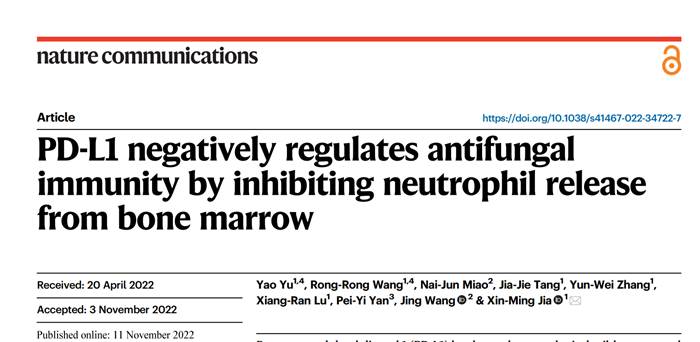On November 11, Professor JIA Xinming's team from the School of Medicine of Tongji University and the 10th People's Hospital affiliated with Tongji University published online a paper entitled "PD-L1 negatively regulates antifungal immunity by inhibiting neutrophil release from bone marrow" in Nature Communications. The research shows that programmed death ligand 1 (PD-L1) negatively regulates antifungal immunity and that upon the engagement of receptor Dectin-1, β-glucan stimulation induces PD-L1 translocation into the nucleus to regulate the production of chemokines CXCL1 and CXCL2, which control neutrophil mobilization in bone marrow, contributing to the negative regulation of antifungal innate immunity. It is found that the derivative ACT001 extracted from Michelactone can effectively inhibit the expression of PD-L1 in vivo, thereby significantly improving the survival rate of mice infected with fungi. Their discovery provides a theoretical basis for a new approach to developing target PD-L1 to treat fungi infections
Professor JIA Xinming shared their story behind the scene in the Behind the Paper section of Health Community of Nature. This was one more research paper published by the research team in Nature Communications this year.

Discovery of JIA Xinming's team published in Nature Communications
PD-L1 is a transmembrane protein that mainly combines with its receptor PD-1 to transmit immunosuppressive signals. It plays an important role in tumor immune escape, bacterial and parasitic infection immunity, autoimmunity, and other diseases. So far, much research has been done on the role of PD-L1 in T cells and DC antigen-presenting cells, but little on the role of PD-L1 in neutrophils and almost none on the regulation of antifungal immunity by PD-L1.
This study revealed through RNA sequence analysis that for mice bone marrow neutrophils and human peripheral blood neutrophils, the expression of PD-L1 was significantly increased after β-glucan stimulation (Fig. 1a-d); Dectin-1 receptor coding gene deletion (Clec7a -/-), but not CARD9 and Syk, significantly reduced the ratio of fungi β-glucan stimulated mice neutrophils to express PD-L1 (Fig. 1e, f). KEGG analysis display β- Glucan activates the neutrophil JAK-STAT signal pathway, which is proved by Western blot β- Dextran stimulation significantly increased the phosphorylation levels of JAK2 and STAT3 in mouse neutrophils, while the deletion of Dectin-1 receptor could significantly reduce them β- Glucan stimulated phosphorylation levels of JAK2 and STAT3 in mouse neutrophils (Fig. 1g, h). Treatment with STATIC, a JAK2-STAT3 pathway inhibitor, can significantly reduce β- The ratio of PD-L1 expression in neutrophils induced by glucan (Fig. 1i). The results show that Dectin-1 activated by β-glucan can mediate the phosphorylation of JAK2 and STAT3, thus regulating the expression of PD-L1 in neutrophils.
